-

人教版新课标PEP小学英语六年级下册Last Weekend说课稿9篇
一、教学内容分析1. 教学内容介绍:.本课是一节复习课,复习内容为Last Weekend A B 两部分。教学主要是10个词组和2个句型,并结合六年级学生即将毕业,在原有教材的基础上融入了大量有关周末活动的句型和短语。使学生在“周末活动”这一话题下,尽可能多地滚动复习更多相关的动词短语。本课要掌握的短语和句子有Words and phrases: watched TV; washed clothes; cleaned the room; played football; visited grandparents; read a book; went to a park; went swimming; went hiking; went fishing;Key sentences: What did you do last weekend? I played football; Did you read books? Yes, I did. No, I didn’t.2. 知识的前后联系:Last weekend的话题是周末活动,关于日常活动的话题已在小学课本中多次出现,例如在B4U2; B5U2; B5U4; B6U1; B6U5; B7U3;B8U3中7次出现。在进行U3 last weekend的复习中,对周末活动的内容要进行深化。除了要求学生能够“四会”掌握本单元的词汇外,还应注意培养学生听、说、读、写的能力,让学生在一定的情景中在句中运用单词,在篇章中运用句子,赋予单词、句子特定的意义,而不是孤立地学习单词和句子,使学生一看到这些单词就能在一定的情景下使用,进而组合这些句子形成篇章,从而培养学生综合运用语言的能力。
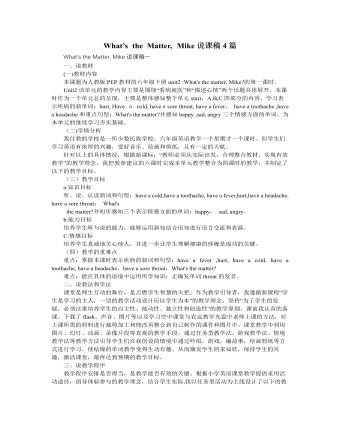
人教版新课标PEP小学英语六年级下册What’s the Matter, Mike说课稿4篇
请个别学生朗读、说出所缺字母并用肢体语言或表情说明意思。4.活动二:a guessing game利用卡片复习上节课的句型。[设计意图] 日常口语操练为学生营造了一个良好的学习氛围,英语歌曲优美动听,口语操练生动有趣,为学习新课打下了良好的基础.Step2Presentation (7 minutes) 活动三Learn the dialogue1.导看:教师用投影仪展示自己的一张旅游的照片和一张不及格的试卷,以此引出 词组a big trip, failed the math test.2.听对话录音,学生跟读。3.教师带读。4.两人一组分角色进行对话练习。5.分两大组朗读对话,对表现好的组予以表扬.6.师生就对话内容进行问答:T:Who looks happy? Why?S:Liu Yun looks happy. She is going on a big trip.T:Who looks sad? Why? S:Sarah looks sad. She failed the math test.[设计意图]使用实物展示来呈现新词组能加深学生对词组的理解和记忆.对于枯燥的句型朗读,采用多种不同的方式,如师生互动、分角色朗读,分组比赛等,避免学生产生疲劳感.

人教版新课标PEP小学英语六年级下册My Holiday说课稿5篇
本课时是本单元的第二课时,属对话课,它是对第一课时词汇课学习的一种巩固和延伸,同时也是下一课时阅读课的铺垫,因此起着承前启后的作用。二、学情分析通过三年多的英语学习,大部分学生已具备了一定的英语学习能力,他们能够听懂有关熟悉话题的语段,能与教师或同学就熟悉的话题交换信息,能读懂简短的的语篇。对于本文中的重点语法项目一般过去时,属于上一单元已学内容,本单元旨在继续巩固其用法,所以学生对该内容不是很陌生。三、教学方法及手段1.教学方法小学英语教学应该把培养学生的学习兴趣、调动学生学习英语的主动性作为教学重点,根据学生的认知规律,本课在应用任务型教学法的大前提下,利用情景教学法以及TPR教学法相结合,以学生为中心,以交际为主线,通过一系列的教学活动吸引学生的注意力,努力让学生积极参与,学以致用,并在用的过程中发展语言能力、思维能力以及交流合作的能力。
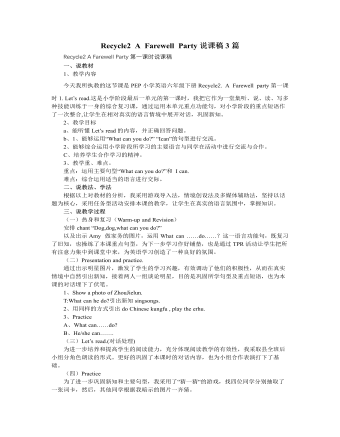
人教版新课标PEP小学英语六年级下册Recycle2 A Farewell Party说课稿3篇
教学目标:(1)知识目标:1.能够听、说、认读句子:Let's read, Let's make ,listen,write,match and say 中的句子。2.能够听懂 Listen and write 部分的录音并正确填写句子。(2)能力目标:通过教学,使学生能够了解英语请柬的内容并会模仿书写英语请柬。(3)情感目标:培养师生之间和同学之间的友谊与情感,积极鼓励学生展现才能。三、说教学重点:1.能够听、说、认读句子:"We're going to have a farewell party . How do you feel? I feel …."四、说教学难点:Is every having a good time?五、说教法:1. 教法设计本节课中,在教学过程中注意发挥学生的主动积极性,给学生一个轻松愉快的语言学习氛围,让学习过程充满乐趣,同时使他们感受到一定的挑战,满足他们的成就感,使思维始终处于积极状态。2. 学法指导重视多元智能教学原理、合作学习法和任务型语言学习法等应用,充分调动学生的感觉器官,想象能力,激发学生积极参与课堂教学活动。

新人教版高中英语必修3Unit 5 The Value of Money-Discovering Useful Structures导学案
4.They were going to find someone to take part in their bet when they saw Henry walking on the street outside.[归纳]1.过去将来时的基本构成和用法过去将来时由“would+动词原形”构成,主要表示从过去某一时间来看将要发生的动作(尤其用于宾语从句中),还可以表示过去的动作习惯或倾向。Jeff knew he would be tired the next day.He promised that he would not open the letter until 2 o'clock.She said that she wouldn't do that again.2.表示过去将来时的其他表达法(1)was/were going to+动词原形:该结构有两个主要用法,一是表示过去的打算,二是表示在过去看来有迹象表明将要发生某事。I thought it was going to rain.(2)was/were to+动词原形:主要表示过去按计划或安排要做的事情。She said she was to get married next month.(3)was/were about to+动词原形:表示在过去看来即将要发生的动作,由于本身已含有“即将”的意味,所以不再与表示具体的将来时间状语连用。I was about to go to bed when the phone rang.(4)was/were+现在分词:表示在过去看来即将发生的动作,通常可用于该结构中的动词是come,go,leave,arrive,begin,start,stop,close,open,die,join,borrow,buy等瞬间动词。Jack said he was leaving tomorrow.
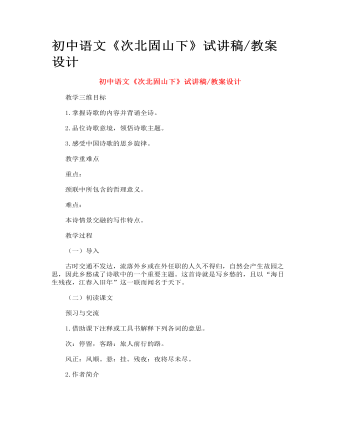
初中语文《次北固山下》试讲稿_教案设计
【交流点拨】 首联:点题。“青山”指北固山。诗人在船上,想象船到镇江后,还要乘驿车到别处,暗含旅途奔波之意。 颔联:写船上所见景色。“平”“阔”“正”“悬”四字用得好:“潮平”,两岸才显得宽阔;“风正”,帆才有悬空的态势。“潮平”句,又是为颈联中“江春”句作铺垫。 颈联:既写景又点明了时令。“残夜”指夜将尽而未尽之际。残夜而东方海日已升,旧年而江上已是春天——时间过得这么快,怎能不令人感慨! 尾联:诗人离家日久,日复一日,年复一年,新年来到,正是家人团聚之时,而自己旅途他乡,久不得归,见到此景,情何以堪?由此他自然想到要借大雁来给他传递家书了。全诗陈陈相因,浑然一体。
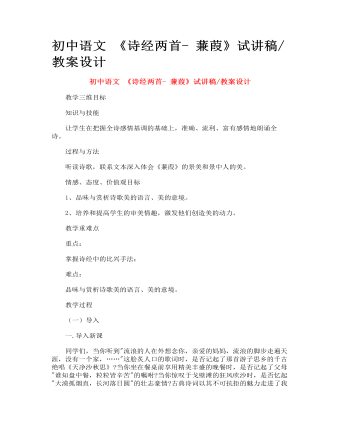
初中语文 《诗经两首- 蒹葭》试讲稿_教案设计
同学们,当你听到"流浪的人在外想念你,亲爱的妈妈,流浪的脚步走遍天涯,没有一个家,……"这脍炙人口的歌词时,是否记起了那首游子思乡的千古绝唱《天净沙秋思》?当你坐在餐桌前享用精美丰盛的晚餐时,是否记起了父母"谁知盘中餐,粒粒皆辛苦"的嘱咐?当你惊叹于戈壁滩的狂风吹沙时,是否忆起"大漠孤烟直,长河落日圆"的壮志豪情?古典诗词以其不可抗拒的魅力走进了我们的生活,为我们的生活增添了更多的美丽与奇妙。今天,让我们一起学习《蒹葭》这首诗歌,再一次用诗歌滋润我们渴求的心灵。
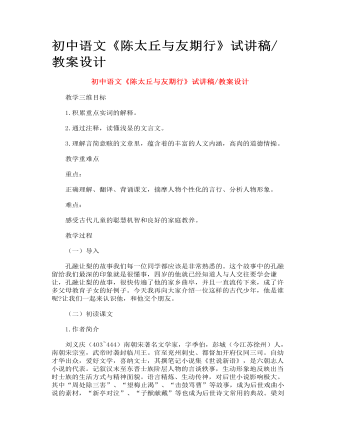
初中语文《陈太丘与友期行》试讲稿_教案设计
刘义庆(403~444)南朝宋著名文学家,字季伯,彭城(今江苏徐州)人,南朝宋宗室,武帝时袭封临川王。官至兖州刺史、都督加开府仪同三司。自幼才华出众,爱好文学,喜纳文士,其撰笔记小说集《世说新语》,是六朝志人小说的代表。记叙汉末至东晋士族阶层人物的言谈轶事,生动形象地反映出当时士族的生活方式与精神面貌。语言精炼、生动传神,对后世小说影响极大。其中“周处除三害”、“望梅止渴”、“击鼓骂曹”等故事,成为后世戏曲小说的素材,“新亭对泣”、“子猷献戴”等也成为后世诗文常用的典故。梁刘孝标作注,旁征博引,为后人所重。另有《幽明录》,今佚。鲁迅《古小说钩沉》辑其佚文200余条,皆记诡异之事。
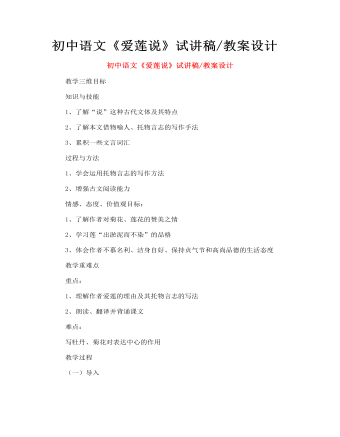
初中语文《爱莲说》试讲稿_教案设计
初读课文 了解文体,熟悉作者 文章的题目是《爱莲说》“爱”表现了作者的感情,“莲”是这篇文章写作的主体,“说” 在这里指什么? 明确:“说”是一种文体,可以说明事物,也可以发表议论或记叙事物 “说”这种文体可以灵活地运用说明、记叙和议论的表达方式,偏重于议论那么题目的意思是什么呢?可以理解为“谈谈爱莲花的道理”或“说说喜爱莲花的道理” 他爱莲花有什么道理呢?大家在学习课文中一定要开动小脑筋 本文作者周敦颐 ,(10171073) ,宋代道洲(现在湖南省道县)人,字茂叔,哲学家因他世居道县濂溪,后居庐山莲花峰前,峰下有溪,也命名为濂溪,学者就称他为“濂溪先生”
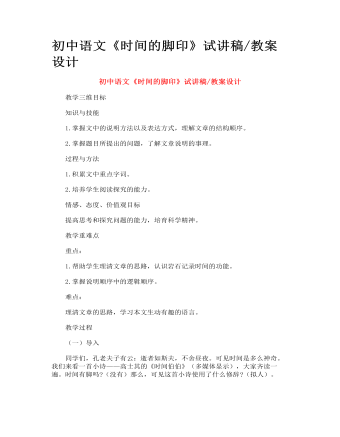
初中语文《时间的脚印》试讲稿_教案设计
同学们,孔老夫子有云:逝者如斯夫,不舍昼夜。可见时间是多么神奇。我们来看一首小诗——高士其的《时间伯伯》(多媒体显示),大家齐读一遍。时间有脚吗?(没有)那么,可见这首小诗使用了什么修辞?(拟人)。 我们今天学习的课文文题就源于高士其这首小诗。(板书课题:8.时间的脚印)这课题也采用什么修辞?(拟人)这是一篇科普作品,了解一下它的作者( 看图了解陶世龙)。先来欣赏图片,第一张自然界中的沉积岩、第二张“恐龙化石”、第三张“三叶虫化石”。(屏幕显示)。我们看到的这些岩石,在保存古代生物的同时,还记下了时间的痕迹。那么,岩石是怎样记录时间的呢?带着这个问题,我们一起来学习《时间的脚印》。我们来看看这节课的学习目标。
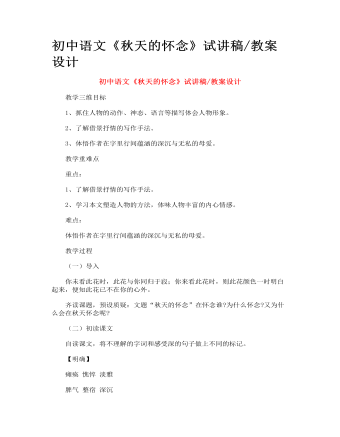
初中语文《秋天的怀念》试讲稿_教案设计
深层探究 在那个树叶“刷刷拉拉”飘落的季节里,母亲离我远去了。我怀念我的母亲,怀念她为我付出的艰辛,为我承受的苦痛和她给予我的爱。除此,母亲还给了我更为宝贵的东西,那是什么? 【明确】:是母亲交给我的生活态度,价值观,她让我有了直面苦难的勇气、信心和力量。 这世间有很多东西,当我们懂得珍惜,回头却发现他已经不在了。比如说光阴、健康、生命、亲情、友情…… 史铁生和母亲的故事,史铁生“好好活”的人生一定让你有所触动,有些问题你可能没有想过,有些话你也没有说过,因为你还拥有着。 (让学生充分展示,说出自己的心里话。) 小结:这是一位病入膏肓的母亲,一位苦难坚忍的母亲;这是一位强大智慧的母亲,一位大爱无声的母亲!这个母亲养育了我,陪伴了我,成就了我。 天底下每一位母亲都同样伟大。她们为儿女同样倾我所有,操尽心机;她们同样青丝白发,毫无保留。
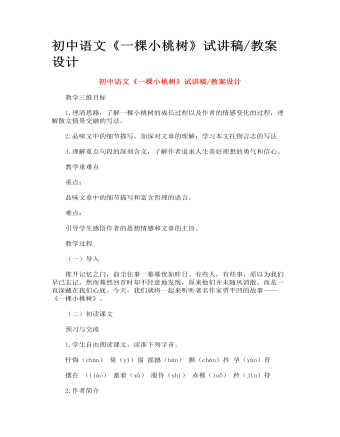
初中语文《一棵小桃树》试讲稿_教案设计
贾平凹,1952年2月21日生于陕西省商洛市丹凤县棣花镇,当代作家。 1974年开始发表作品。1975年毕业于西北大学中文系。1978年凭借《满月儿》,获得首届全国优秀短篇小说奖。1982年发表作品《鬼城》《二月杏》。1992年创刊《美文》。1993年创作《废都》。20**年,先后担任西安建筑科技大学人文学院院长、文学院院长。20**年凭借《秦腔》,获得第七届茅盾文学奖。20**年凭借《古炉》 ,获得施耐庵文学奖。20**年3月22日,澳门大学向贾平凹颁授了荣誉博士学位。
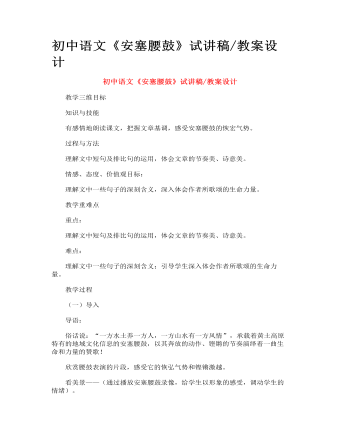
初中语文《安塞腰鼓》试讲稿_教案设计
精读课本,贯通全文 提问:整篇文章极富震撼力,文章中一个排比接一个排比,一个高潮连一个高潮,大家从中体味到了什么? 明确: A、这是一篇歌颂激荡的生命和磅礴的力量的文章。 B、全文洋溢着一种阳刚之美。 C、表现要冲破束缚、阻碍的强烈渴望。 朗读赏析探究 赏美图,配佳句——为了让大家对被誉为“天下第一鼓”的安塞腰鼓有更直观的认识,我们再来看几组特写照片。看后请各小组用课文中的文句与之相配并高声朗读。 明确:对排比句进行总结,说出对句子的理解。 怎样理解“耳畔是一声渺远的鸡声”? ①鸡啼预示天明,是新的一天的开始,是希望的象征。 ②这是以声衬静,用鸡啼反衬火烈的鼓声停止后大地的寂静。 说美点,品美韵——这篇文章美吗?美在哪里? 语言美: 课文多用短句来表现内容;大量运用排比,有句内、句与句、段与段之间的排比,交错出现,连用许多。
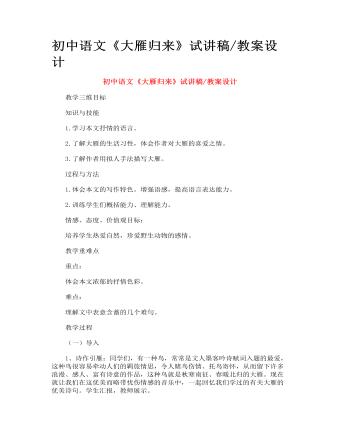
初中语文《大雁归来》试讲稿_教案设计
1、诗作引雁:同学们,有一种鸟,常常是文人墨客吟诗赋词入题的最爱,这种鸟很容易牵动人们的羁旅情思,令人睹鸟伤情、托鸟寄怀,从而留下许多浪漫、感人、富有诗意的作品,这种鸟就是秋寒南征、春暖北归的大雁。现在就让我们在这优美而略带忧伤情感的音乐中,一起回忆我们学过的有关大雁的优美诗句。学生汇报,教师展示。 征蓬出汉塞,归雁入胡天。——王维《使至塞上》 长风万里送秋雁,对此可以酣高楼。——李白《宣州谢眺楼饯别校书叔云》 乡书何处达?归雁洛阳边。——王湾《次北固山下》(思乡情怀) 塞下秋来风景异,衡阳雁去无留意。——范仲淹《渔家傲》 云中谁寄锦书来,雁字回时,月满西楼。—— 李清照《一剪梅》 2、引入课题:由此可见,中国人眼中的大雁是这样的富有诗情画意,是这样的充满浪漫色彩。那你想不想知道,外国人心中的大雁是怎样的吗?今天,就让我们跟随美国生态学家利奥波德一同走进大雁的世界。请大家打开课本111页,第十四课,大雁归来(出示课题和作者)
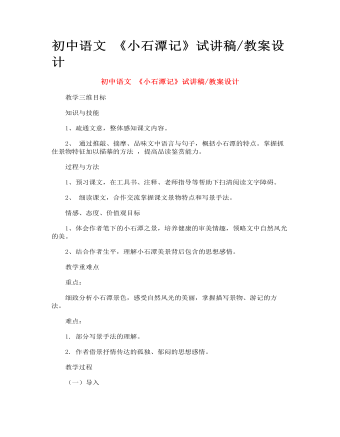
初中语文 《小石潭记》试讲稿_教案设计
大家都知道,在中国文学史上有不少的文人用他们的笔墨描写过优美的山水,比如说我们以前学过: 唐 杜牧《江南春》: 千里莺啼绿映红,水村山郭酒旗风。南朝四百八十寺,多少楼台烟雨中。 杜甫《望岳》:岱宗夫如何? 齐鲁青未了。造化钟神秀,阴阳割昏晓。 荡胸生层云, 决眦入归鸟。 会当凌绝顶, 一览众山小。 郦道元在《三峡》中也有“春冬之时,则素湍绿潭,回清倒影。”这样引人入胜的景色。可以说优美的山水诗文不可枚举,那么今天让我们跟随柳宗元一起走进小石潭,看看又是怎样的一幅山水画呢?他又是怎样的心情写下这篇游记的呢?
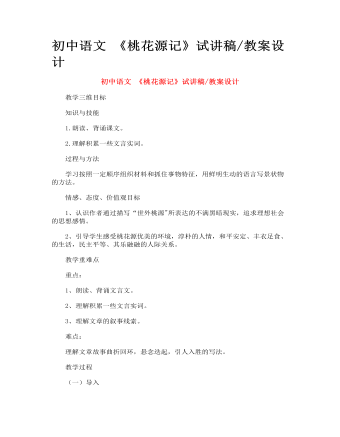
初中语文 《桃花源记》试讲稿_教案设计
陶渊明生于东晋末朝,出身于没落的地主官僚家庭。他少时颇有壮志,博学能文,任性不羁。当时社会动乱不安,他有志不得展。做过小官,由于不满官场的丑恶,弃官回乡,这时他四十一岁,从此过着“躬耕自资”的隐居生活。忧愤、饥寒、劳累、赢疾一起折磨着他,六十三岁去世。后称靖节先生。他所作的诗文,内容多描写农村生活,表现了优美的自然风光,抒发他热爱田园生活、乐于和农民来往和不愿与统治者同流合污的高尚感情;但也包含了乐天知命、消极适世的因素。在形式上一反当时华而不实的文风,明朗清新,质朴自然,善于抓住客观事物最突出的特征,淡淡几笔传神的表现它的形象,简洁含蓄而富有韵味,对后代作家有较大的影响。本文写作年代大约是宋永初二年(421年),其时陶渊明已经五十七岁了。他拒绝同刘格的来政权合作,不满黑暗的政治现实,同时由于他和农民接近,理解他们追求理想社会的愿望,所以写了这篇记和诗。
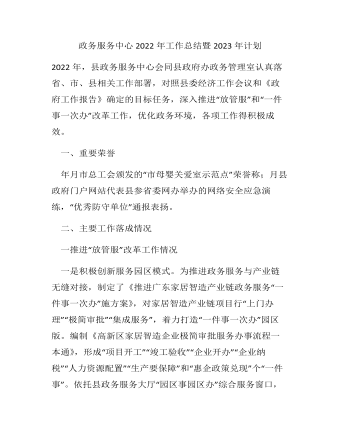
政务服务中心2022年工作总结暨2023年计划
一、重要荣誉 年月市总工会颁发的“市母婴关爱室示范点”荣誉称;月县政府门户网站代表县参省委网办举办的网络安全应急演练,“优秀防守单位”通报表扬。 二、主要工作落成情况 一推进“放管服”改革工作情况 一是积极创新服务园区模式。为推进政务服务与产业链无缝对接,制定了《推进广东家居智造产业链政务服务“一件事一次办”施方案》,对家居智造产业链项目行“上门办理”“极简审批”“集成服务”,着力打造“一件事一次办”园区版。编制《高新区家居智造企业极简审批服务办事流程一本通》,形成“项目开工”“竣工验收”“企业开办”“企业纳税”“人力资源配置”“生产要保障”和“惠企政策兑现”个“一件事”。依托县政务服务大厅“园区事园区办”综合服务窗口,组建了园区上门“帮代办”服务专班,明确各职能单位分管领导和联络员,规范“帮代办”服务流程,通过“一对一”帮办代办服务,全力为企业提供“母亲式”服务。二是大力推进涉企经营许可事项告知承诺制。布县本级第一批项施告知承诺制的涉企经营许可事项清单,编制《县涉企经营许可告知承诺应手册》,一次性告知准予许可条件、应当提交料和期限、后续监管规则、违反承诺后果等要,共梳理行告知承诺的申料项占总料数量的,其中承诺后补料项,事后现场核查料项,现企业准营极简审批。今年已通过告知承诺方式共办理共场所卫生许可、小餐饮经营许可等事项余件,企业群办理业务从原来的“跑两趟、至少天办完”,变为“最跑一趟、当场领证”,跑动次数和审批时间分别压减、以上。
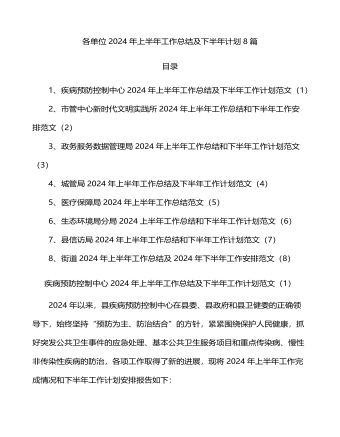
各单位2024年上半年工作总结及下半年计划
6、不断提升经办服务能力。推动医保政务服务事项网上办、一次办,进一步健全“好差评”制度,窗口办件好评率x%,连续x个月被市政务中心评为“优秀窗口”“优秀首席审批员”。7、加强两定机构管理。一是对市域内两定机构开展2022年度考评工作。二是做好日常结算审核,每月审核人员按x%的比例抽查病历与系统比对审核,发现问题及时反馈给医院督促整改到位。三是制定细则,组织定点医药机构每月进行自查自纠。四是科学编制2024年总额预算,结合我市城乡居民、城镇职工医保基金运行情况,编制了2024年医保基金总额预算方案。三、下半年工作打算1、规范两定机构医保协议管理。一是严格履行协议。督促各定点医疗机构对照总额预算额度、费用指标、协议规定的管理条款,制定医院内部基金管理制度、方案和管理目标,围绕总额费用进一步规范医疗服务行为,合理控制住院人次和住院次均费用。
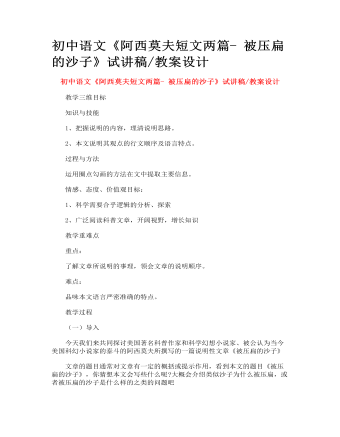
初中语文《阿西莫夫短文两篇- 被压扁的沙子》试讲稿_教案设计
质疑问难,合作探究 1、文章是介绍沙子的知识吗? 明确: 有关恐龙灭绝的原因,原来本文的主角不是沙子,而是恐龙。 2、题目是《被压扁的沙子》,内容却恐龙灭绝的原因,题目《被压扁的沙子》是否偏离主题了?我们换成《恐龙是怎样灭绝的》会不会更好? 本文题目不但没有离题,还能提示读者,恐龙灭绝的“撞击说”所以产生,与被压扁的沙子的科学发现和科学研究密不可分此外,文题形象性强,容易激起好奇心,引起人们的阅读兴趣 3、恐龙灭绝的原因一直是学术界有争议的问题,因而产生两种学说“撞击说”“火山说”在探究恐龙灭绝的原因时,作者的观点是什么?他的观点以什么为依据,又是怎样推论出来的?
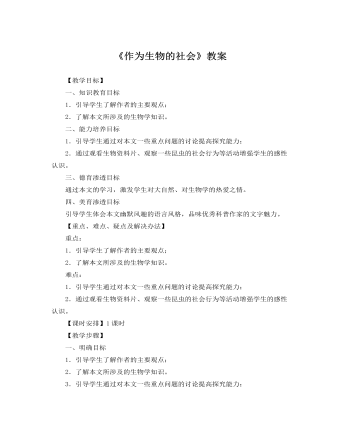
人教版高中语文必修5《作为生物的社会》教案
二、整体感知1.导入新课同学们《细胞生命的礼赞》是一个医学家、生物学家关于生命、人生、社会乃至宇宙的思考。思想博大而深邃,信息庞杂而新奇,批评文明,嘲弄愚见,开阔眼界、激发思索。而其文笔又少见的优美、清新、幽默、含蓄,无愧当今科学散文中的大家手笔。无怪乎自1974年出版后,立即引起美国读书界和评论界的巨大反响和热烈欢呼,获得当年美国国家图书奖,此后18年来由好几家出版社印了二十多版,至今畅行不衰!年过花甲的刘易斯·托马斯的名字因这一本小书而家喻户晓,有口皆碑,以至于在他接连抛出后两本书时,书商都不用再作广告,只喊声"《细胞生命的礼赞》一书作者刘易斯·托马斯的新著"就够了。今天我们就来学习选自这部书的精彩章节《作为生物的社会》(板书课题)。


